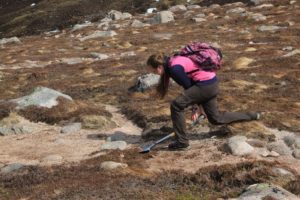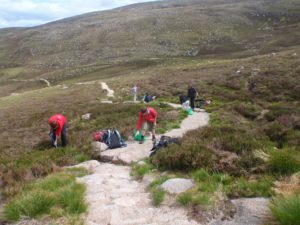Junior Ranger Case Studies: Cairngorms National Park
To provide guidance and information on how to run the Junior Ranger programme, EUROPARC started to gather case studies describing how the programme is structured and managed in different parks.
These case studies, in form of short interviews, are mainly intended to provide inspiration and ideas to Protected Areas willing to start the programme.
About Junior Ranger Cairngorms
The Cairngorms National Park Junior Ranger Project has been running since 2009. We set it up to provide an opportunity for young people to act as Ambassadors for the national park, learn about its special qualities and to find out about the Ranger profession.
The programme is delivered by Ranger Services across the whole of the national park. We have 5 Junior Ranger groups operating in the park.
The Junior Ranger Programme provides an opportunity for young people to act as Ambassadors for the national park, learn about its special qualities and to find out about the Ranger profession.
How do you recruit young people? How many Rangers/Mentors are involved and how many Junior Rangers?
The young people are recruited through their high school as each Junior Ranger Group is based around the school catchment area. There are 5 groups in total and each year 70 young people take part in the programme. There are 12 Ranger Services and 4 other partners involved in delivering the 5 programmes across the park.
How are your activities organised? How many times you meet? What kind of activities do you do?
Each of the 5 groups has a 5 day non-residential programme once a year. This is followed by a voluntary programme of activities and events such as camps and conservation days.

The 5 day programme consists of conservation and adventurous outdoor activities and is based around the 4 Challenges of the John Muir Award.
What are the main results and benefits for young people and for the Protected Area?
Increased understanding and awareness of the special qualities of the Cairngorms. Increased confidence and self-esteem, skills and knowledge gained and social skills improved through working with other young people.
The Junior Rangers develop confidence and self-esteem, and improve their social skills through working with other young people.
What are the main costs and how do you finance them?
The main costs are transport as the park is very large! These costs are covered from the core funding of the Cairngorms National Park Authority. Junior Ranger uniform and outdoor activities are also a considerable costs – these too are covered by the park authority.

Would you like to share any other useful information?
The opportunity to go on camps and meet other Junior Rangers is really important and a great motivation to keep young people involved. This too is the case for having the Youth+ programme and the opportunity for progression.
Do you also want to share your experience with running the Junior Ranger Programme in your park? We will be happy to spread your ideas around – just drop us a mail: f.minozzi@europarc.or
